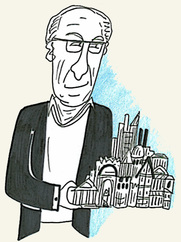Emdashes—Modern Times Between the Lines
The Basics:
About Emdashes | Email us
Ask the Librarians
Best of Emdashes: Hit Parade
A Web Comic: The Wavy Rule
Features & Columns:
Headline Shooter
On the Spot
Looked Into
Sempé Fi: Cover Art
New Yorker Festival: Simon Schama
Filed under: New Yorker Festival Tagged: Afghanistan, Barack Obama, Cicero, Drew Friedman, Florence Gould Hall, George W. Bush, George Washington, history, Hurricane Katrina, Iraq, Jimmy Carter, John McCain, Nobel, Pollux, Ronald Reagan, Simon Schama, Teddy Roosevelt, Thomas Jefferson, Winston Churchill

Pollux writes:
The ever-present electric blue New Yorker festival banner greeted me as I filed into Florence Gould Hall at four o’clock in the afternoon last Saturday.
I sat in the back. Simon Schama soon strolled out: he was confident and witty, and constantly took swigs from his bottle of water.
The stage lit up with Drew Friedman’s cover for the January 26, 2009 issue of The New Yorker. It’s called “The First,” and depicts Barack Obama as George Washington.
It was an appropriate backdrop, for Schama’s lecture was on “Obama and History.”
Schama argued, convincingly, that Obama is quite conscious of his place in history and his ability to make history through speeches alone. Obama’s critics have attacked the president for empty speechifying, and during the primaries Hillary Clinton had accused Obama of spinning gossamer webs of rhetoric that lacked substance.
But Schama said that Obama’s words can be considered “performative speech-acts” —that is to say, vocalizations that generate new historical epochs through the sheer force of the words themselves.
A prime example: Obama’s “They said this day would never come” speech on Iowa caucus night in January 2008.
Obama’s speeches aren’t merely ornamentation, Schama said, and the president’s winning of the Nobel Peace Prize recognizes the performative power of the president’s words to bring about change.
Teddy Roosevelt, enthusiastic leader of the Rough Riders during the Spanish-American War, won it too. So did Winston Churchill -but the British Prime Minister won it for Literature.
Schama said that the president is compulsively self-conscious about history, and that the president channels his “inner Cicero” as he tries to make real change possible.
Time is of course divided into arbitrary capsules, and human beings are usually not conscious of entering a new era. For example, people in the Middle Ages were not aware that they were medieval people living in an intermediary “middle era.”
Self-consciousness about entering into new historical eras can be bizarre and laughable. Schama quoted an example from an old film in which a medieval figure stands on a balcony and says, “Gentlemen! The Renaissance is here!”
How does Obama’s election fit into the larger scope American history? Obama’s election turns Declaration of Independence, up until now a list of fictions, Schama said, into reality. We are privy to a genuine moment of history, Schama said, and the original sins of the Founding Fathers regarding slavery and rights for all men can now be exorcised with Obama’s election. The Constitution is restored.
Schama said that sober-realism and being a “wet-blanketeer” is considered an “un-American” quality, and Obama has to tread a fine line between Jimmy Carter’s “Calvinist prophetic gloom” and Ronald Reagan’s silly triumphalism.
Obama’s bet during that election, one that panned out, was that the majority of Americans were fed up with the affably inarticulate George W. Bush. Bush’s “pseudo-folkloric wisdom” was no longer cute or charming in light of Katrina (“Brownie, you’re doing a heck of a job”), and Bush’s visceral bombast and repetition of beloved certitudes were no longer effective. American anti-intellectualism only goes so far.
The 2008 election was a referendum on character. Schama said that the election involved choosing the best “CEO of the sinking enterprise of the USA.” Obama’s calm composure and “summer of silence” won out over McCain’s rants and erratic sputters.
Now that history-conscious Obama is president, the president is aware that the wars in Afghanistan and Iraq are as much wars of words as conflicts involving guns and planes, Schama said.
Schama also pointed to the dilemma that has plagued the United States from its founding. How do we avoid foreign entanglements, as Washington had hoped, and avoid becoming just another power-hungry empire?
But Jefferson and Washington knew that we would not be able to avoid conflict when the world is full of enemies of democracy. Obama moves, Schama said, with a tragic self-awareness through history.
The time for change is now. Simon Schama’s lecture on October 17 was an enlightening look at Obama as a history-maker and at time and history itself.





Comments
A very detailed summary. I wish I had been there.